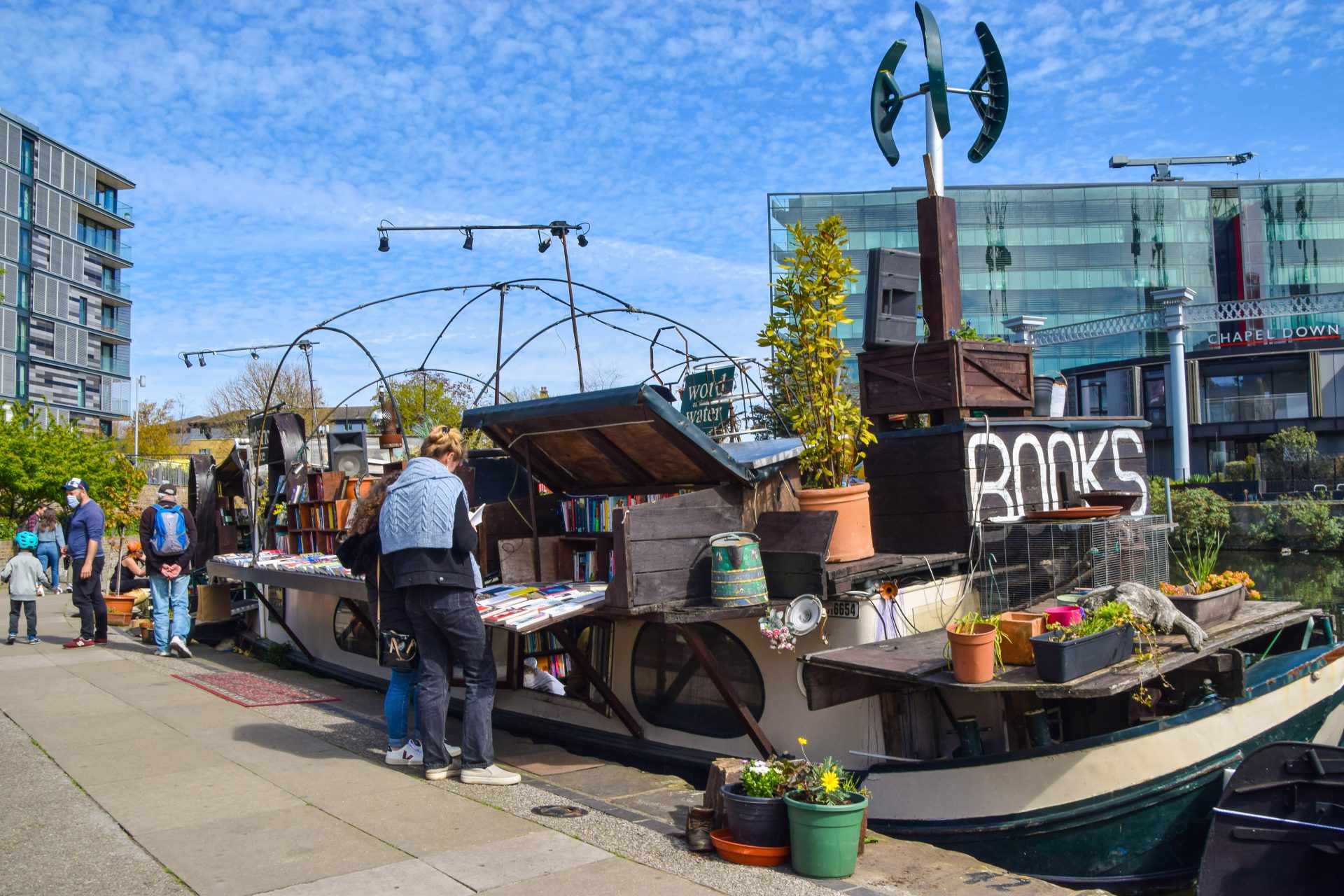The book trade remained surprisingly buoyant during the pandemic. Industry-wide, publishing held up well despite the closure of bookshops during lockdown.
Online trade remained strong, with Amazon continuing to dominate the market. Web sales at Foyles and Blackwells performed decently while the closest things Amazon has to direct online competitors, hive.co.uk and bookshop.org, also kept readers who didn’t necessarily fancy helping Jeff Bezos catapult himself into the stratosphere well-supplied with reading material.
Independent bookshops beefed up their online presences and came up with innovative methods of keeping their tills ticking over, such as offering free local delivery and click and collect facilities.
Now that we’re emerging tentatively into something approaching normal life again, rising Covid infection rates notwithstanding, you’d think it might be time for publishers and authors to breathe out and look forward optimistically to a resumption of events, festivals, in-store browsing, the reassuringly regular rhythms of the book business.
Well, possibly not.
First of all, there is a very real danger of an imminent shortage of paper. The boom in online shopping has led to a massive increase in demand for cardboard packaging, so much so that there are reports from across Europe of printing companies converting some of their premises purely to cardboard production.
The owner of a leading printing company in the Netherlands said last month that while he can usually expect to wait no more than a couple of weeks for paper deliveries, “now I have to wait four months”.
It’s not just a European problem either. In the US the book distributor Ingram issued a statement earlier this month warning that “the book industry, like all physical goods industries, is experiencing Covid’s negative logistic impacts due in large part to labour and supplies shortages and transportation issues”. There is, the statement warned, “a perfect storm brewing”, and US publishers are already pushing back some imminently scheduled titles until next year.
Even if supplies do hold up in the UK and there’s enough to satisfy both pizza deliveries and new books, the Brexit-related shortage of lorry drivers means that British printing firms could still struggle to maintain the supplies they need.
As I write this I’ve just heard from a British literary journal advising that their next issue is on hold because their printers simply don’t have the paper to meet the order, blaming a combination of Brexit and Covid.
The first books to suffer will be popular titles that sell out their existing stock. Top-up supply runs are purely sales-driven and hard to predict, ordered at short notice and requiring quick turnarounds. Gaps on the shelves where existing bestsellers should be will indicate potential larger problems further down the line.
While the effects of Brexit will exacerbate any significant paper shortage, they can’t be blamed as the root of the problem. Alas, that isn’t true of another issue looming on the horizon from which industry insiders fear major damage to the UK book trade and the livelihoods of authors in particular. This one is constructed from foundations to roof tiles on the sunlit uplands of Brexit.
In June the British government through its Intellectual Property Office began a consultation on replacing the EU’s copyright regulations with what’s known as ‘international exhaustion’.
Copyright is the most significant protection that authors hold in a profession where income is always uncertain and dependent on many factors beyond their control. Copyright effectively ensures an author’s ownership of their work and is what guarantees they receive an income from their book sales.
Books are sold at different prices in different markets: in nations where the cost of living is lower cover prices are accordingly lower too. Current copyright regulations mean these cheaper international editions of books by EU authors – and for the moment UK authors too – cannot be sold in the UK and EU.
If as a result of the consultation the British government chooses not to replicate that protection, a handsoff policy termed ‘international exhaustion’, there’s a good chance the market here will become flooded with the cheaper editions.
Publishers’ incomes will drop accordingly and so, by extension, will that of authors who already receive the smallest portion of a book’s cover price.
Even without this possibility authors are already facing bigger financial challenges than ever before. In 2019 a survey on behalf of the Society of Authors revealed that the average annual income of a professional author to be just £10,500. Damaging changes to copyright laws would see that figure fall even further: the UK Publishers Association predicts that international exhaustion would wipe around £2.2bn from the industry every year.
The world of authorship is already skewed towards the wealthy, writers already financially secure enough to fund the time needed to write books for whom that £10,500 average is not necessarily a crucial amount.
Making access to the industry even more prohibitive for those from poorer backgrounds means diverse voices already struggling to be heard will become even rarer.
While the massive publishing houses might be able to survive international exhaustion, some smaller, independent presses who publish many of those diverse voices will inevitably go to the wall. Similarly, independent bookshops that already have the flimsiest financial safety net would be the first to close their doors.
Nicola Solomon, the chief executive of the Society of Authors, said the proposals under consideration “will affect opportunities for established and mid-list authors as well as prospects for new and aspiring writers: in a word, less diversity across all genres and writing professions – from non-fiction to fiction and translation to illustration. We need more authors, from more diverse backgrounds writing more books for ever-wider audiences. That will only happen if authors are able to make a decent living from their work, supported by world-leading copyright standards”.
Stephen Lotinga, chief executive of the Publishers Association, added, “This is a critical moment and the biggest threat to our industry post-Brexit. The strength of the UK’s copyright laws is key to ensuring that authors and publishers are paid for their work.”
Authors including Philip Pullman, William Boyd and Hilary Mantel have thrown their support behind the Save Our Books campaign, with the double Booker-winning Wolf Hall author adding: “Most writers live and earn precariously, even with the protections now in place. Their original creative work, however humbly rewarded, underlies a major industry and feeds our cultural life as a nation. This is not the time to strip away protection to their livelihood.”
The signs are not particularly promising. The consultation was launched by the business secretary Kwasi Kwarteng, a Thatcherite freemarketeer, with the comment that Brexit allowed Britain to come up with its own new system as “a standalone sovereign nation”, not a phrase generally associated with progressive policies that benefit those outside the cabal of government cronies.
As ever, the Tories’ generally short-sighted approach to Britain’s cultural exports betrays a chronic undervaluing of the role of the arts in terms of finance and international perception.
As well as the reputational enhancement the UK gleans from its literature, the UK publishing industry turns over £6bn every year and supports more than 70,000 jobs, many of which would be under threat as a result of international exhaustion.
The campaigning organisation Save Our Books has been set up to co-ordinate opposition to the proposals and has published a letter signed by 2,661 people from across the industry.
“The UK currently has strong copyright laws which enable creators to be fairly compensated for their work and the UK to export more books than any other country in the world,” it reads. “Weakening the UK’s copyright laws would impair our ability to earn an income which would have a devastating impact on this country’s vibrant, worldrenowned book industry. If writing becomes a profession only accessible to the wealthy, important stories will not be told.”
Even more frustratingly for UK based authors, on June 7, the same day the UK government’s consultation process began, a beefed-up European Union Copyright Directive introduced in 2019 passed into law in EU countries, giving extra protection to the work and income of people who rely on their own creations to make a living in the EU.
The government that brought us Brexit isn’t renowned for its understanding of the importance of cultural activity in this country. It doesn’t seem to realise the importance of the arts, literature included, in how Britain presents itself to the world. Add to that the devotion to the free market of Kwasi Kwarteng, the man ultimately in charge of the consultation, and the outlook for authors, publishers, readers and the global perception of Britain itself doesn’t look great.
■ To find out more, visit www.saveourbooks.org.uk
A European Library
A weekly selection of fiction and nonfiction, new and old, building into a comprehensive literary portrait of our continent
8. THE PRINCE Niccolò Machiavelli (Penguin Classics, £3.99)
Five hundred years after publication, The Prince remains a key moment in European history and literature. So much so that the name of its author has become an adjective, Machiavellian, scheming and ruthless. This English translation runs to just 85 pages but Machiavelli’s treatise, published in 1532, marks a key moment in European thought – the first work to divide ethics from politics since Aristotle united them. Dedicated to Lorenzo de Medici, who never read it, The Prince is an unsettling manifesto of statecraft based on the acquisition of power without moral obligation. “There is such a gap between how one lives and how one should live that he who neglects what is being done for what should be done will learn his destruction rather than his preservation,” writes Machiavelli in a work that simply refuses to ever stop being relevant.




